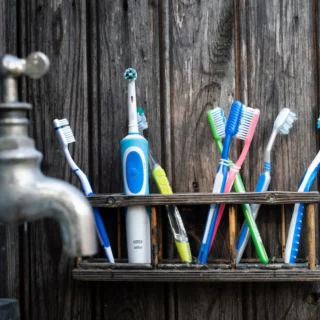This website uses cookies so that we can provide you with the best user experience possible. Cookie information is stored in your browser and performs functions such as recognising you when you return to our website and helping our team to understand which sections of the website you find most interesting and useful.

Electric vs. manual – are electric toothbrushes always better?
January 28, 2021Since the invention of the first true electric toothbrush in the 1950s, the technology behind them has certainly improved. While they were initially intended to help people with reduced motor skills or orthodontic implements like braces, they quickly became popular across the wider population. And with the number of people choosing some kind of electric option increasing slightly in recent years, you may be wondering what all the fuss is about.
However, the NHS recommends that “it doesn’t matter whether you use an electric or manual toothbrush”. In this article we’ll look at why exactly they say this, pros and cons of both types of brush, and why deciding between electric or manual (or even both!) isn’t the most important factor in maintaining a healthy mouth.
Benefits of electric and manual brushes
For something you’ll do as regularly as brushing your teeth, the most important thing is to feel truly comfortable with the tools you use. In truth, everyone will have their own preference as to which option feels most beneficial. But if you’re struggling to decide between the two, here are some vital factors to consider.
Electric
Electric brushes undeniably require less physical effort to ensure a good clean. This may not sound like much of a benefit, but many people appreciate the assistance when brushing first thing in the morning. You can learn more about shaping your morning routine to prioritise your oral health here.
There is also evidence to suggest electric brushes are slightly more likely to prevent plaque and gingivitis, all things being equal. This is linked to the fact they require less physical effort – with electric brushes ensuring more consistent pressure across the entire mouth.
Built-in timers – available on newer electric models – also help you brush for two solid minutes, which is the recommended length of time for each brush.
Manual
However, manual toothbrushes themselves come with a range of practical benefits. First and foremost, they are significantly cheaper than electric brushes – with even higher-end items like Curaprox’s brush with nylon bristles available at a fraction of the cost of electric models.
You’re less likely to accidentally ‘over-brush’ with a manual brush. When using an electric brush, any change in pressure has a much bigger impact on your teeth and gums, which over time can lead to damage. Their manual counterparts allow for more control over the pressure used – and still offer a high-standard clean if pressure is applied consistently.
Manual brushes are also more easily replaceable on-the-go, while the fact they don’t rely on chargers and adapters make them much more simple to transport.
Is cost the biggest factor when it comes to choosing?
While manual brushes might have the edge when it comes to practicality and electric brushes when it comes to ease of use, by far the biggest difference between the two is their respective costs.
You’ll have to spend at least £30 for a good quality electric brush, while the brush heads still have to be replaced every three months to maintain a high standard of cleaning. With these replacement heads often costing more than a brand new manual brush would, it’s worth considering whether going electric is really worth the cost.
As it happens, achieving and sustaining strong oral health is down to far more than the kind of brush you use. Regardless of the brush, taking care of your mouth is in your hands.
Why oral health habits matter more than brush type
While studies do suggest electric brushes are slightly more adept at clearing plaque, any benefits of this are wiped out if your oral care routine isn’t up to scratch. When we talk about routine, we mean brushing with the right technique, and making good practices habitual. Putting these cornerstones in place is – by a distance – the most important part of building strong oral health, but the stats don’t make pretty reading. In the UK:
- 29% of people only brush once a day – with most of these neglecting the all-important evening brush
- 25% of people don’t use fluoride toothpaste
- 68% of people don’t floss
Clearly, improving the UK’s oral health habits is far more important than what the most popular brush type is. After all, what good is a brush that cleans slightly more consistently if harmful plaque and bacteria are left to build up and cause damage every night?
At Floe,our subscription box is designed to help you build the perfect oral care routine. We do this by ensuring you never run out of the tools you need to take care of your teeth and gums by delivering top-ups every three months.
We’ll send you:
- A powerful Curaprox toothbrush – with 5460 soft nylon bristles, you’ll get an unbeatable clean with a manual brush.
- Two specialist fluoride toothpastes – DAWN for morning whitening, and DUSK to clear plaque before bed.
Natural floss – made from bamboo fibres and coated with candelilla wax and organic peppermint oil, it clears plaque where brushing (even electric) can’t reach.
Subscribe now to kickstart your oral care routine, and get 50% off your first box by using the code hellofloe!
Bitesize news direct to your inbox.
Sign up for Bitesize, our monthly newsletter, for the latest dental tips, healthcare news and more, including 25% off your first box



